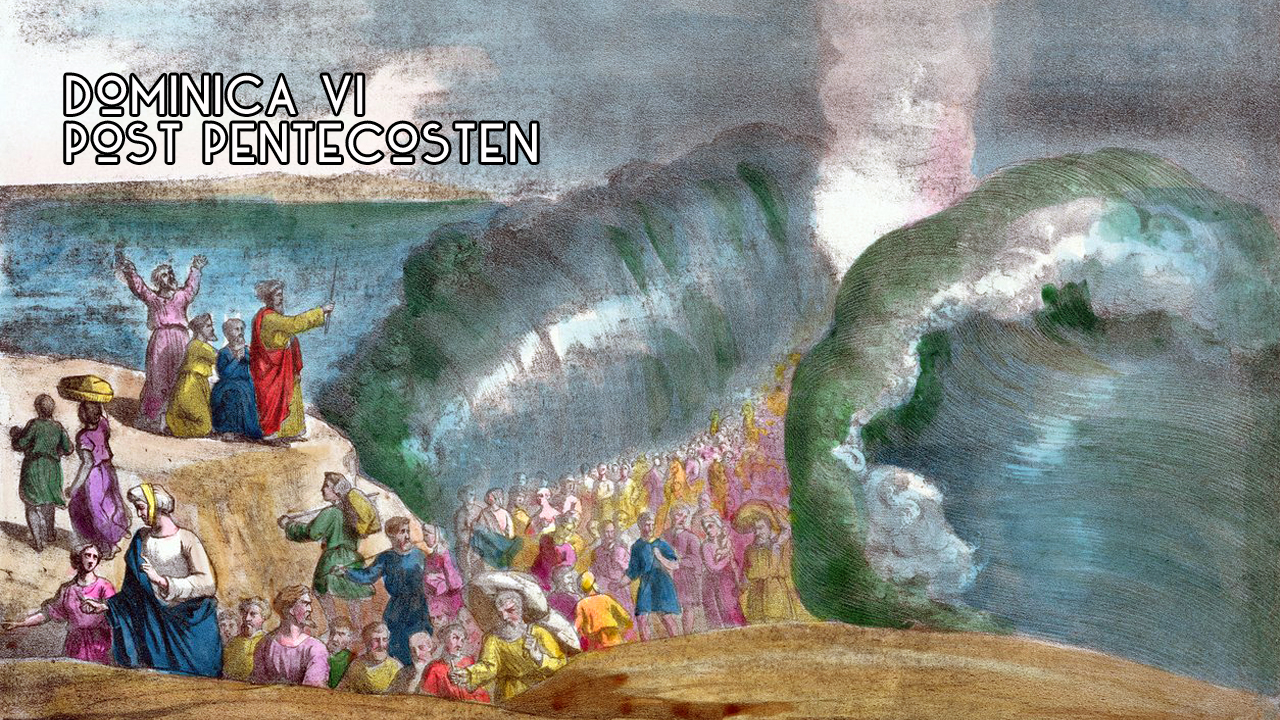|
Getting your Trinity Audio player ready...
|
On this 6th Sunday after Pentecost, we return to Epistle readings from the letters of Paul. Last week we had a reading from a letter of Peter, historically brought in on that Sunday because of the gravitational pull of the Feast of Sts. Peter and Paul. From now on we continue in the time after Pentecost with St. Paul, reading from Corinthians, Galatians, Ephesians, Philippians, and Colossians. As I write, it is the Vigil of the Feast of Sts. Peter and Paul, to be followed by the feast itself and then the Commemoration of St. Paul, this year superseded by the Sunday. If St. Peter received the keys of authority from our Lord, then St. Paul, as St. John Chrysostom remarks, received the keys of wisdom to make him the great Apostles to the Gentiles.
Our Epistle pericope this Sunday is from the Letter of Paul to the Romans. In this passage is a connection between the Resurrection and Baptism. Paul says that we are “baptized into His death”. Hence, we can look at the baptismal font as a mystical tomb. Once dead in Original Sin, we went with faith into that font, as it were. St. Cyril of Jerusalem wrote: “when you go down into the water and are, in a fashion, entombed in the water as [Christ] was in the rock” (Catechetical Lectures 3.12). We emerged, risen from the death of sin to new life. From that moment we are “sýmphytoi…planted together, united”. In his commentary on Romans the early Greek Father Origen takes this to mean being grafted, like a shoot or branch, into Christ’s Passion. Our intimate integration into the Body of Christ the Church, effected by that death and rising laver, means that we have an ongoing union with Christ’s Passion and death as well. The risen and ascended Lord ever offers and reoffers and renews to the Father His Sacrifice. We are bound up in his death and rising. As a result, we as individuals and as a Church will always be experiencing something of the Lord’s Passion along with His Resurrection, each being felt more or less intensely according to the circumstances. Now, for example, it seems that Church is entering into a great trial during which there will be diminishment and suffering on the part of the faithful who embrace an authentic sensus fidei fidelium… the faithful’s sense of the faith.
Earlier in Romans, Paul wrote about our justification by faith in Christ. In chapter 6, he unfolds the implication of this justification for our moral lives. Baptism brought us out of death in sin. Now we must be dead to sin.
In Genesis, before God’s Spirit moves, there are chaotic death waters absent of life. Thereafter, water abounds. The great destructive flood of waters is a pivot point between death and new life. In Exodus 14, the people depart from their living spiritual death in Egypt by passing through the waters. Death on one side, life on the other. The passage through the waters in Exodus foreshadows the Passion and Resurrection of the new Moses and the sacrament of Baptism. In Mark 10, before Christ goes to Jerusalem James and John ask the Lord to sit in glory at His left and right. Christ responds sharply, referring to his looming Passion as a “baptism”.
The death he died he died to sin, once for all, but the life he lives he lives to God. So you also must consider yourselves dead to sin and alive to God in Christ Jesus.
“Quod autem vivit, vivit Deo… zôntas dè tô theô…”. The dative case of “God” here rings out with our new orientation. The lingering wounds of Original Sin notwithstanding, we are to be living toward/for/unto God intentionally and in fact. Sacraments have implications. Sacraments are not just symbolic, they are transformational. Baptism isn’t just a ceremony of inclusion into a community. It changes a person forever, blending us into the ebb and flow of Christ’s Passion, dying and rising. This is all worked upon and in us by God, not by the minister or ourselves the recipients. In fact, we hear in the Latin and the Greek the strength of this fact of God’s work, not our doing, in the string of passive mood descriptors… baptizati summus… consepulti… complantati….
Lastly, I averted above to the Church’s own passion. It cannot be any other way. If we as a Church are grafted into Christ in such a way that we describe her as the Body of Christ, or as St. John Paul II did, “one single mystical person, the total Christ” (1986, Apostolic Letter Augustinum Hipponensem, 3) we must experience what He experienced.
As we now enter into July, the month dedicated especially to devotion to the Most Precious Blood of the Lord – the Feast is 1 July – and when we venerate the Mother of God under the title of Our Lady of Mount Carmel, let us ask the Lord to wash over us all His saving and healing grace. Let us ask Our Lady to put her mantle over us and protect us from spiritual harm, especially at the hands of those whose charge it is to build us up rather than tear us apart. On the lead up to the Feast of Our Lady – 16 July – lift your petitions to her often and with a clean heart. Prepare for this with a good confession and Holy Communion.


